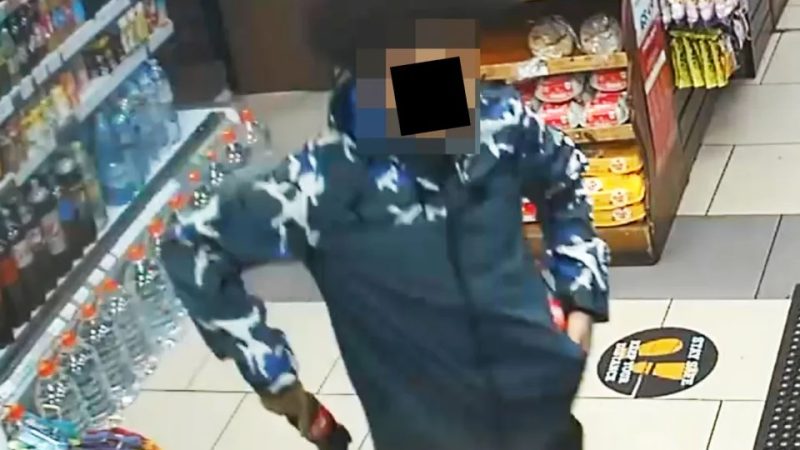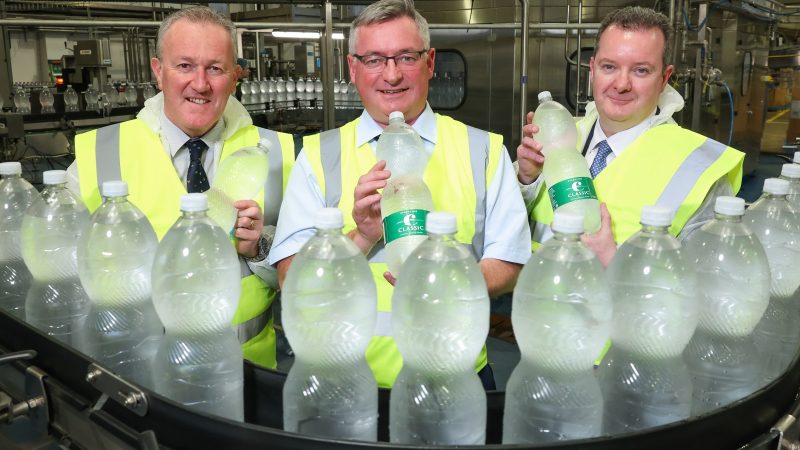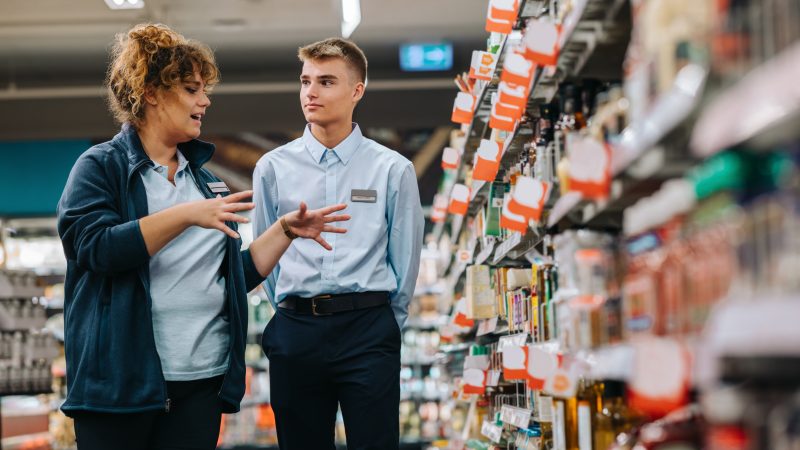Covid accelerated store tech that was years away: Henderson NI MD Martin Agnew

Covid has accelerated the adoption of store tech that would have been years down the line, reveals Henderson NI MD Martin Agnew.
While the wholesale and retail company has been an early adopter of new tech, the arrival of Covid meant they had to pivot quickly and start pushing out new ways of doing things that had been in the pipeline.
“Almost overnight we had to find new ways to do things to enable people to work from home. We fast tracked changes that we were going to do anyway that would have taken many years,” Mr Agnew says.
That includes a fast shift to a paperless way of working, such as using SignNow to electronically sign off on paperwork and maintain a rapid workflow, as well as going contact-free in stores themselves.
“We try to have as contactless an environment as possible. We’ve had a huge increase in the number of self-checkouts in stores.”
New store tech
Henderson has also made use of the Glory cash management system which allows cash transactions to be made without staff handling the cash, has piloted Scan and Go in four stores, is trialling order and delivery apps throughout stores and is starting to introduce electronic shelf labelling which allows staff to make price changes on the aisles without leaving the back office.
“These are all things that were to be implemented over time but are ready to go right now because of shopper demand for these things and the savings they deliver on labour and accuracy,” Mr Agnew says.
“Store management systems took staff off the shop floor at a time when we were limiting the number of customers on the floor and reducing points of contact. In many ways Covid has fast tracked the changes that were coming down the track.”
Moments of joy
While 2020 and 2021 has been a truly memorable time to be heading up a major retail and foodservice organisation, it hasn’t been without its glimpses of joy.
It’s only a handful of months since dad-of-three Martin (59) became a grandfather for the first time. Due to Covid, he was unable to go to the hospital so the news that his new grandchild had arrived came through while he was watching the rugby at the Kingspan stadium.
“Just before half time I got the message, and the guy beside me had to tell the entire row!” he laughs.
Back to the warehouse
Martin is the fourth generation to go into the family business and has been involved ever since his summer job in the school holidays. He still has an abiding affection for the warehouse where he started out.
“I grew up in warehouses and when I go into the warehouses on site today, they have the same smells there – it still feels like a warehouse. But if you take a step back and see where you are now and imagine what the business was like back then, it’s quite different.”
Mr Agnew started his working life in SPAR chain James Hall and Co in Preston before coming back home to work in the Ross Cochran mineral water business, then part of Hendersons, and then moving into the logistics side.
“I’d always loved the warehouse and documented the warehouse management system that Halls had put in, and my first project was to implement that system in our warehouses,” he says.
Over the years he moved into more logistics roles and in the 90s when his father decided it was time to take a step back, he took on the role of joint managing director of the overall business, alongside brother Geoffrey.
Evolving business
At that stage, as the larger multiples were starting to move into Northern Ireland, Henderson began to expand their company-owned store estate, buying a number of stores including the former BP and Shell-owned sites. The company had also bought TNB in 1978 and acquired the former VG wholesale business in 1980 which is now reborn as ViVO.
As Henderson moved into the retail market, it soon found a new need to develop retail systems that would allow it to keep abreast of a fast-moving business ecosystem.
“We had a consortium which was effectively developing an EPOS system. But it was difficult to do by committee so we took the bull by the horns and developed the source code ourselves,” Mr Agnew says.
The danger for a big retailer, he says, is that you can spend a lot of time putting a new system in place only to see it go out of date in a few years.
“We do our own software development and we’ve just put our first bot in, using machine learning so that a lot of really repetitive tasks can be managed by those bots,” he says.
“We’re also training staff in the new way of working, so that they can drive improvements rather than waiting for software development. Our app-based business transformation presents opportunities for each department.
“It’s a fusion of creating the right culture, giving the right skills and providing new tools and fast-tracking development across the business.”
New customers
In recent years, the general trend has been towards growing the size of stores to accommodate a better offer, particularly on the food-to-go side.
“Covid changed the nature of the business somewhat – it benefited the retail business and brought new customers into the store who we have been able to retain,” Mr Agnew says.
“The frequency of visits dropped naturally, but we have seen the spend for each visit go up as shoppers use our stores more for everyday weekly needs, and we’ve tried to adapt our range to cope with that, build bigger stores and expand existing ones to give shoppers more space. We invested £19.4M into retail in 2021, and have 26 significant projects lined up for 2022.”
Contingency planning
Henderson had business contingency plans in place, but Mr Agnew admits, as with the rest of the world, they didn’t know exactly what to expect when Covid was looming.
“I guess we’d seen this thing coming but not quite knowing what to expect and not appreciating the quite dramatic change it would make to the landscape of society. We thought it would be over much more quickly than it proved to be,” he says.
“But when we realised the magnitude of what was coming, we got everybody working from home. The incident management team met on a daily basis and all our directors were on a call every morning for weeks and weeks.
“The priorities were to ensure the safety of all staff and shoppers, keep the stores open and the supply chains going, keep the goods coming in, and keep cash in the business to pay our bills.”
Leap forward
Since the gradual reopening of the hospitality sector, he says, the foodservice end of the business is now ahead of where it was in 2019.
“We’re well up on the retail business on 2019, and have just about found ourselves in front in Northern Ireland when it comes to foodservice, but not in the Republic where there have been more restrictions in place for longer.
“It’s been very stop-start and it has been hard for the sector to retain people – so many people left when the sector closed down and got jobs elsewhere. It’s been hard to attract people back in – there are still staff shortages and chef shortages.
“In retail, it’s been the reverse challenge – the retail business has been trying to cope with extra demand and mitigate the surge. I suppose business has continued in 2021 much as it did in 2020, opening new stores, acquiring new stores as they became available, preparation on the tech side of the business.
“The food service business is starting to come back, though. 2022 will be different for hospitality purely from a consumer behaviour point of view – hopefully where staycations decrease, overseas tourism for NI will grow again.
Supply chain disruption
The company has been managing supply chain disruption, partly due to the pandemic and partly in the wake of Brexit. Disruption has been minimised through local sourcing, stock-build, and supplier engagement. This has allowed the business to maintain strong availability across the store network.
“We’ve done a lot of work across the supply chain with suppliers in terms of how we handle goods and the efficiency of the supply chain,” Mr Agnew says.
One example of efficiency savings is how Hendersons have been working with Coca Cola, bringing pallets of product directly from the Coca Cola HBC depot onto the shopfloor to form the display, rather than unpacking onto shelves.
“We call it the ‘one touch’ approach – if we can, we will bring product straight to the store and onto the shopfloor, but you need volume to be able to do that,” he says.
Brexit changes
With Henderson Foodservice operating across the whole of Ireland means some goods from GB are sold in the Republic.
“We can’t use the same systems for our foodservice business that have been developed to import goods for Retail from GB, so there’s been a lot of re-sourcing goods from Ireland or the EU. With up to 30% of our foodservice product range we had to re-source and find new suppliers and then negotiate new terms – it’s been a huge effort, particularly when it comes to customer contracts. However, those customers know we’re doing the best for them to get back up and running in a steady and sustainable way.”
“Business operates best in a stable operating environment, and we need frictionless trade. If Northern Ireland wants to attract more inward investment, we need clarity and certainty for those investors.”
Digital downside
Henderson has been in the fortunate position to be able to navigate some particularly choppy waters of the dual challenges of the past couple of years – but there are other threats out there that must be prepared for, including the negative side of the digital revolution.
For example, in recent weeks a colleague wholesaler in GB was targeted in a major cyber-attack which shut down more than 300 stores when its IT systems were hit.
While tech has improved our efficiency, we can see it being used in ways that disrupts and takes down business,” Mr Agnew says.
“Cybercrime is growing and we’ve seen different government systems being hacked into. It’s not going to go away – it’s about trying to keep one step ahead of the hackers.”
And one step ahead Hendersons will continue to be; they have recently announced an investment of £47M for 2022 that will cover new locally sourced products and ranges, plus its continued expansion of infrastructure, including 26 significant retail projects to be implemented this year.
Mr Agnew finished, “We don’t ever stand still in our industry, and the learnings of the past couple of years partnered with the advancements of our technology will see great opportunities and innovations from Hendersons this year, and beyond.”
For the full feature in the Neighbourhood Retailer yearbook, click HERE.







